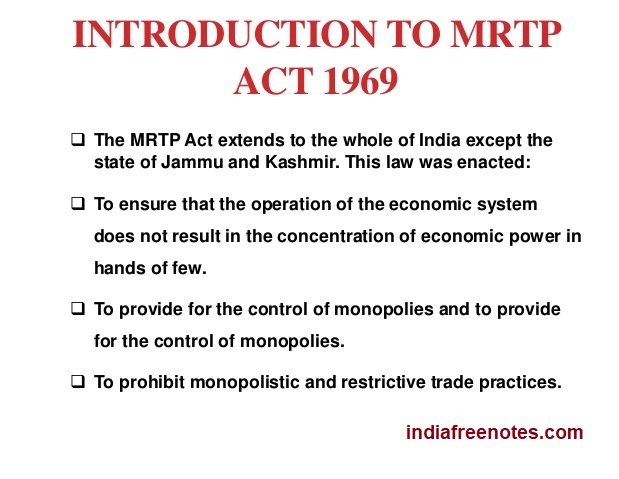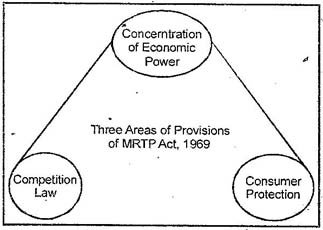The Monopolies and Restrictive Trade Practices (MRTP) Act, 1969, aims at preventing concentration of economic power in the hands of few business houses. The Act provides for control of monopolies, probation of monopolistic, restrictive and unfair trade practice and protection of consumer interests. Premises on which the MRTP Act rests are unrestrained interaction of competitive forces, maximum material progress through rational allocation of economic resources, availability of goods and services of quality at reasonable prices and finally a just and fair deal to the consumers.
Aim of Monopolistic and Restrictive Trade Practices (MRTP) Act, 1969
- Prevention of concentration of economic power to the common detriment
- Control of monopolies
- Prohibition of Monopolistic Trade Practices (MTP)
- Prohibition of Restrictive Trade Practices (RTP)
- Prohibition of Unfair Trade Practices (UTP)

The Act has three areas of Regulatory Provisions
Concentration of economic Power, Competition Law and Consumer Protection. The MRTP Act 1969 came up to ensure that there is no concentration of economic power at a single place. Besides it also checked the restrictive, monopolistic and restrictive trade practices.
The main body to monitor this act is MRTP Commission that has right to inquire into any complaint that is related to monopolistic trade practice and is also having right for recommending any concrete plans for making any action to the central government. The MRTP is the only body that has the right to inquire, cease or award compensation in case there are some restrictive and unfair trade practices being practiced.

The MRTP Act extends to the whole of India except Jammu and Kashmir. This does not apply to following (unless specifically stated by the Central Government):
- Any undertaking owned or controlled by the Government Company,
- Any undertaking owned or controlled by the Government,
- Any undertaking owned or controlled by a Corporation, not being a company established by or under any Central, Provincial or State Act,
- Any Trade Union or other Association of Workmen or Employees formed for their own reasonable protection as such workmen or employees,
- Any undertaking engaged in an industry, the management of which has been taken over by any person or body of persons under powers by the Central Government,
- Any undertaking owned by a Co-operative Society formed and registered under any Central, Provincial or State Act, any Financial Institution.
With the new economic reforms introduced in 1991, the Monopolistic and Restrictive Trade Practices (MRTP) Act, 1969 was duly amended. In the context of the New Economic Policy Paradigm, India has chosen to enact a new competition law called the Competition Act, 2002 (Act, for brief). The Monopolistic and Restrictive Trade Practices (MRTP) Act, 1969 has metamorphosed into the new law, Competition Act, 2002. The new law is designed to repeal the extant MRTP Act.